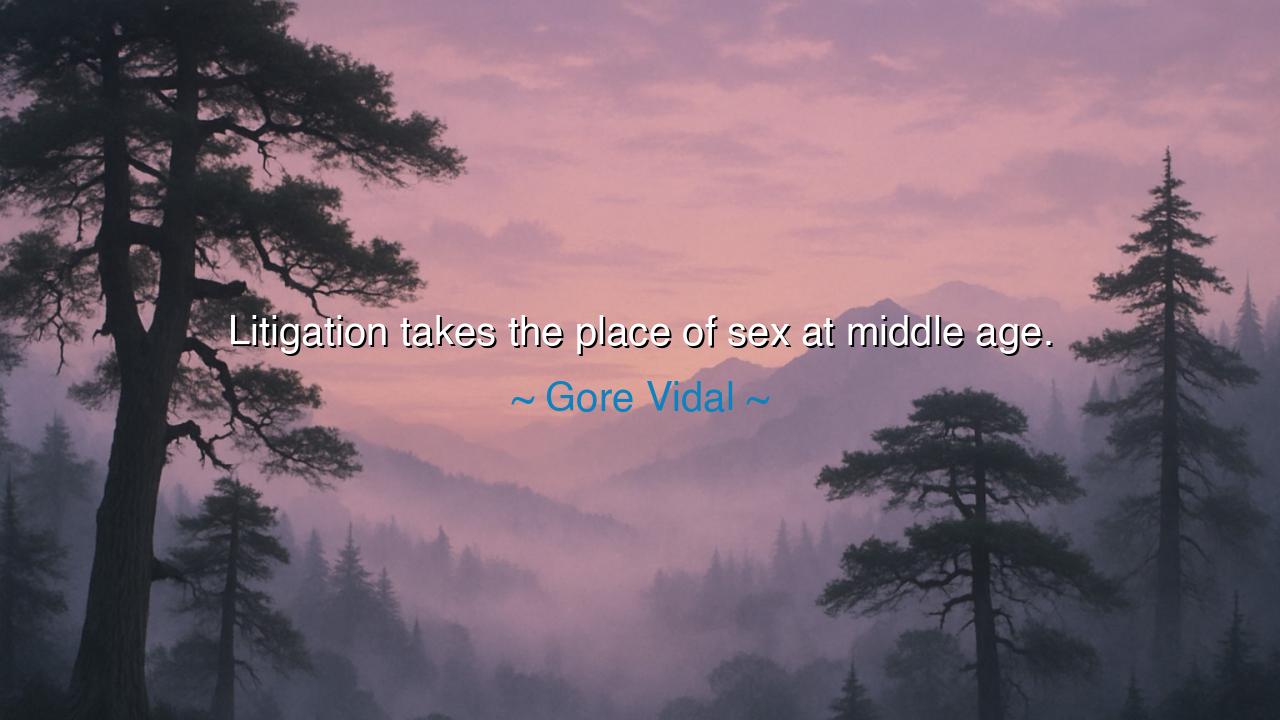
Litigation takes the place of sex at middle age.






"Litigation takes the place of sex at middle age." These words, spoken by the sharp-witted Gore Vidal, carry with them a striking reflection on the nature of desire, power, and conflict in the human experience. Vidal's statement, though provocative, speaks to a deeper truth about the evolution of passions as time passes. As the years advance and the physical desires of youth fade, the intensity of human cravings does not disappear but rather transforms. What was once a pursuit of pleasure and connection becomes, for some, a struggle for control, for validation, and for dominance. This shift, according to Vidal, finds its outlet not in the bedroom, but in the courtroom—in the realm of litigation, where disputes are fought, egos tested, and the thirst for power and recognition plays out in legal battles rather than intimate encounters.
Consider the ancient warriors, whose youthful energy was channeled into the thrill of battle. In their prime, their passions were expressed through the intensity of physical combat, through the act of staking their claim to the world around them. But as they aged, their battles became less about the body and more about the mind, about strategy, about outwitting their adversaries. Take, for example, Alexander the Great, whose early years were spent leading armies to conquer vast swaths of land. But as time wore on, the fire of conquest became a more internal struggle, one where political maneuvering and the control of kingdoms replaced the physical conflict of his youth. The same force that drove him to conquer nations would eventually be turned inward, transforming into struggles of power and governance rather than of raw, youthful ambition.
Vidal's observation, then, speaks to the way in which the human spirit shifts its desires as it ages. In youth, the passion for connection, for physical intimacy, is often all-consuming. Yet, as middle age approaches, this energy is redirected into different avenues. Litigation, the act of fighting for something intangible, often becomes a new battleground. In the absence of youthful vitality, the desire for assertion and the need to "win" take on a new form. This, according to Vidal, is a natural evolution—the desire for victory, once expressed through physical means, is now enacted through legal and ideological conflicts.
This transformation is not a new phenomenon. The great thinkers of the Renaissance, like Niccolò Machiavelli, understood that the passions of men are always shifting, influenced by age, experience, and the state of the world. Machiavelli himself, who once saw the world through the lens of personal ambition and military strategy, later shifted his focus to the politics of the court and statecraft. His writings, filled with sharp insights into human nature, remind us that as time passes, the nature of power struggles evolves from physical confrontation to more subtle and intellectual pursuits. What Vidal speaks of is an ancient truth: as one matures, the channels through which desires are expressed change, often finding themselves channeled into more cerebral, and sometimes more destructive, paths.
Look at the famous philosophers of old, such as Socrates and Plato, whose earlier lives were marked by the pursuit of physical achievement and the creation of new schools of thought. Yet, as their years advanced, their desires shifted from the body to the mind. They fought not with swords but with words, in the public arenas of debate and philosophical inquiry. In the same way, the litigation Vidal speaks of can be seen as a metaphor for the battle of ideas, a place where one fights not for physical intimacy but for dominance in the intellectual and legal spheres.
The lesson, then, is twofold. First, we must recognize that desire and passion are not static forces—they evolve with time. What once drove us to physical acts of pleasure and connection may shift into a longing for mental conquest, for the thrill of winning a battle of words or ideas. This is a natural progression, yet one that should be approached with awareness. Just as the warrior must adapt his strategy as he grows older, so too must we navigate the changing landscape of our own desires.
Second, Vidal's words warn us about the nature of conflict in middle age. We must ask ourselves: when the physical battles of youth are behind us, what do we fight for? Do we channel our energies into constructive endeavors, seeking growth and understanding, or do we turn to the courtrooms of life, seeking to win at any cost? The true challenge of middle age lies not in the conflict itself, but in the way we choose to engage with it. Let us choose to use our power not to fight, but to build, not to dominate, but to create.
In practical terms, this means recognizing the shifting nature of our passions and redirecting them toward positive and constructive goals. Whether in the legal arena, in our personal lives, or in our work, we must strive to harness our inner desires for good—to seek justice, not for the sake of winning, but for the sake of growth and wisdom. Let us be mindful of the battles we choose, and let us fight not for personal gain but for the greater good. Middle age, like any stage of life, is not a time to seek dominance, but a time to seek purpose.






AAdministratorAdministrator
Welcome, honored guests. Please leave a comment, we will respond soon